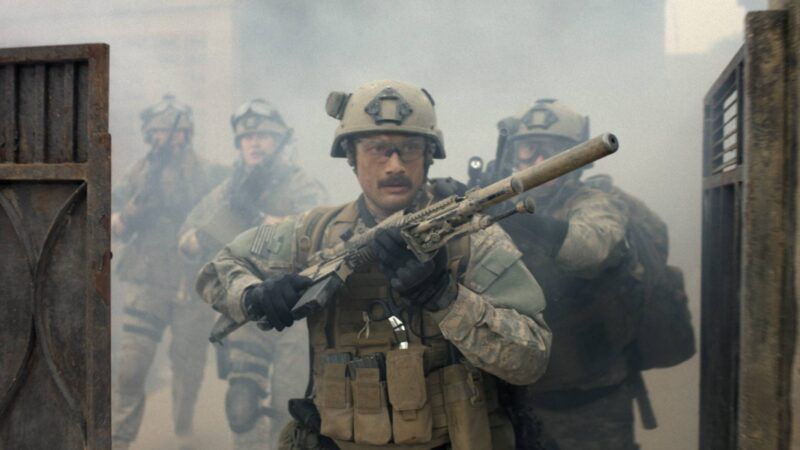Alex Garland's Warfare Refuses To Soften the Blow of Combat
A Civil War follow up that depicts the bleak, meaningless, moment-to-moment terror of modern war.

Night.
Quiet.
Somewhere in the Middle East.
Armed men in fatigues enter a structure on a residential street, flashing lights in the eyes of terrified residents.
When dawn breaks, they're encamped on the top floor, having knocked through a concrete barrier to reach an upstairs apartment.
They wait. And wait. They send coded messages.
And then, after a while, a grenade drops through a hole in the wall, and an hour of brutal violence breaks out.
There's chaos, gore, screaming, and not a lot of meaning. Some people are permanently injured. Some people die.
That's warfare. It's also Warfare, the breathtaking new film from Alex Garland and Ray Mendoza.
Mendoza is a veteran of the Iraq war, and the film is based on a real-life encounter he was involved in. The film informs viewers that participant memories were the only source material used. And after the initial nighttime home invasion, the battle is relayed in more or less in real time, with half an hour of tension and boredom leading to an hour of violence and terror.
We learn the names of the soldiers on screen, but not much about them. There's virtually no backstory, no humanizing moments of shared memories about girlfriends or favorite meals. Aside from a brief, near-surrealist moment at the very beginning, when the soldiers leer at a spandex-clad woman in an exercise together, there are no jokes or moments of levity to firm up the comradery between the men at war. There's barely any story or narrative arc at all. Soldiers take a house. Eventually, they are attacked. An initial rescue operation fails. Things get worse from there. At some point, it's over. That's really it. There's nothing comforting, nothing heroic, nothing emotionally satisfying about it. Warfare refuses to soften the blow of combat.
This movie won't be for everyone. The extreme violence and lack of emotional hooks make for a cold and even grueling cinematic experience. This isn't an anti-war film in the mold of Platoon or Saving Private Ryan, with their operatic notions of tragedy, redemption, and maybe heroism. Even Stanley Kubrick's chilly, bleak Full Metal Jacket occasionally provided viewers an off-ramp with moments of dark, absurdist humor.
Garland is the writer of 28 Days Later, which, like the movies he's directed—Ex Machina, Men, Annihilation, Civil War—often dabble in absurdity, treating the world as a fantastical place that cannot really be grasped by human understanding.
But he treats the formless absurdity of existence more like body horror. Garland tells stories about chaotic worlds where the fragile rules that hold civilization together have broken down, pitting humans against each other or their surroundings, in a struggle for survival. That struggle warps people, often in frightening, literal ways, reducing people into something no longer fully recognizable as human.
That makes the moment-to-moment visceral terror of modern combat a perfect subject for his interest in portraying humanity in a Hobbesian state of violent disorder. In warfare, as in a zombie apocalypse, the foundations of civilization collapse, and existence becomes an uncaring, incomprehensible fight for survival. It's man in a state of nature, and it isn't pretty.
It is, however, technically and formally impressive in a way that few films achieve, especially at more modest budget levels. Garland's precise framing and methodical pacing ratchets up tension even, perhaps especially, during the extended opening act, during which very little happens at all.
That makes it something of a companion piece to Garland's most recent film, Civil War, an underrated and sometimes misunderstood movie about the breakout of a new American civil conflict.
That film annoyed some viewers because it didn't fully explain the causes of the war—something about a president staying in power through a third term—and posited multiple warring factions that didn't map neatly onto today's left-right political divides.
Like Warfare, Civil War was relentless and episodic, with boredom punctuated by outbursts of reality-shredding violence. It refused to provide the sort of comforting context or narrative conventions that most war films indulge in. It didn't "both sides" the conflict; its worldview was more like "no sides." In effect, it insisted that trying to reason through who was right and who was wrong and what the issues and causes were missed the point, and the savage reality on the ground.
Part of the movie's argument was that these conflicts never really make sense, at least not in the moment, not on the ground or in the trenches. Warfare is just about eking out some sort of momentary survival—and so is Warfare.
If you want a story, or heartfelt moments, or a sense of grand meaning, you'll have to look to the legends of history or the lies of politics. But not to Alex Garland.


Show Comments (16)